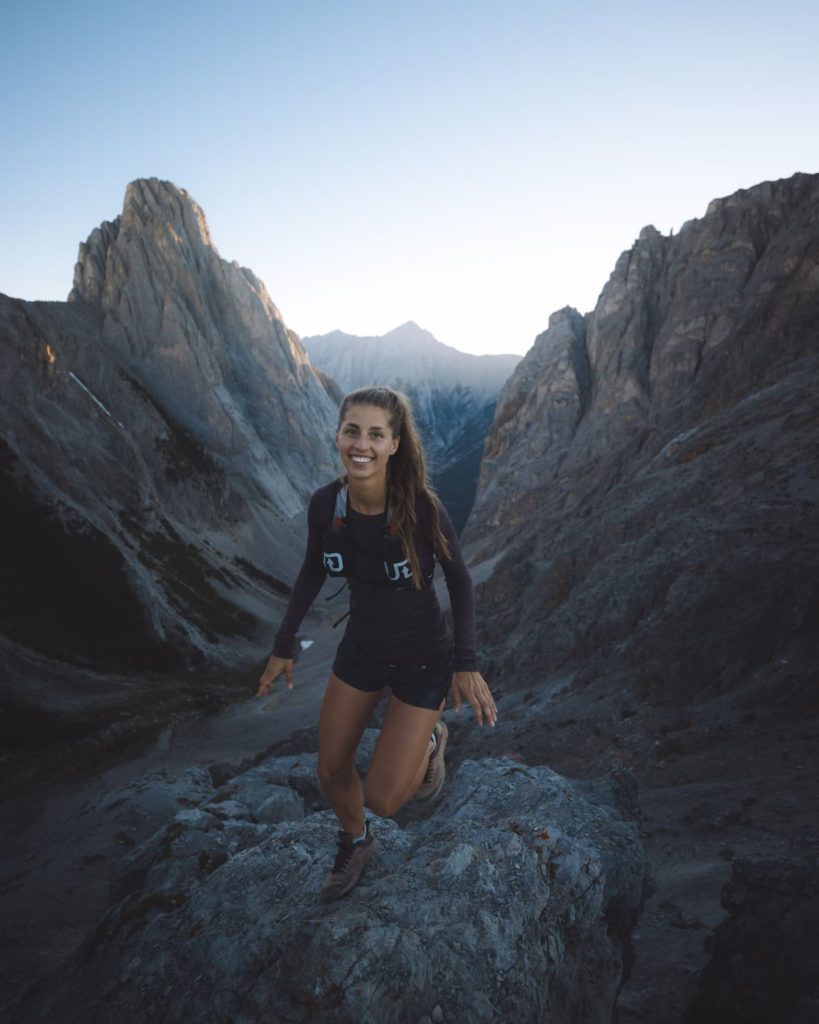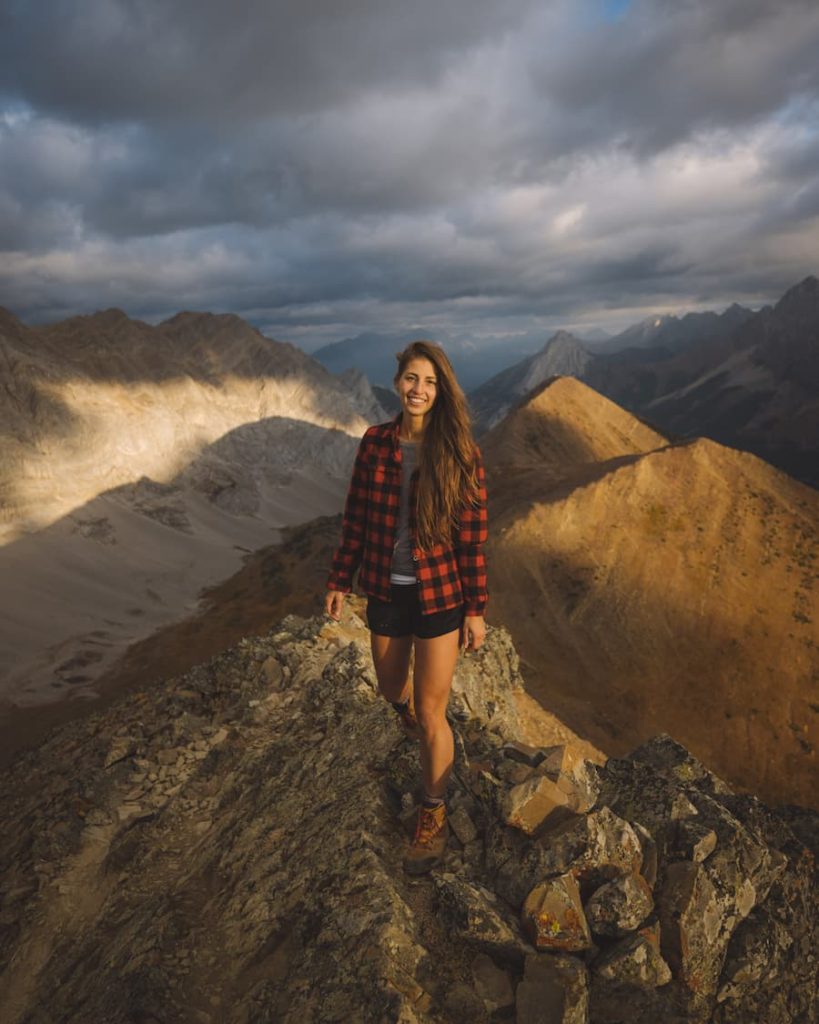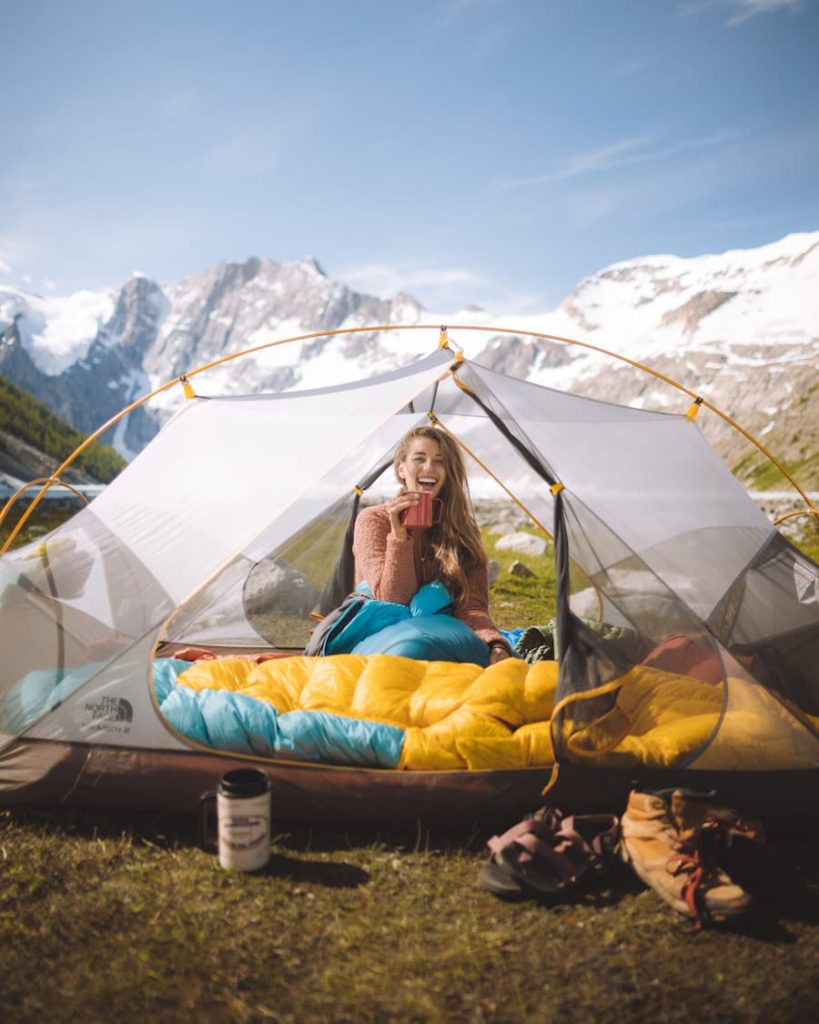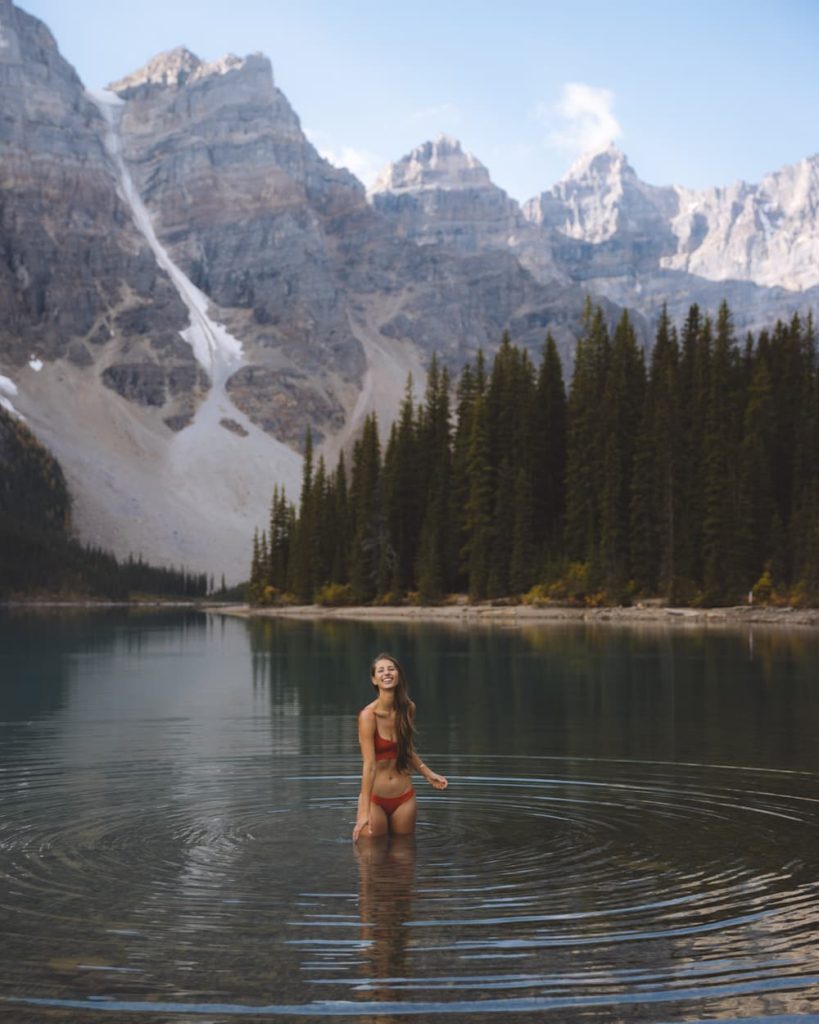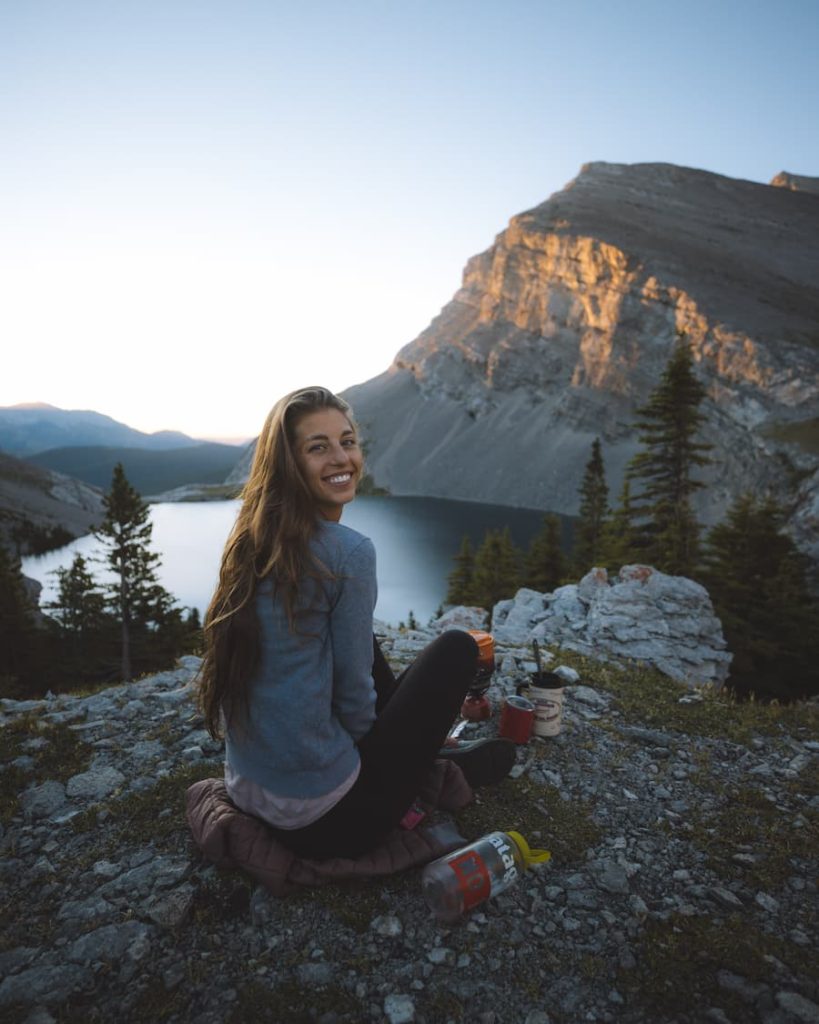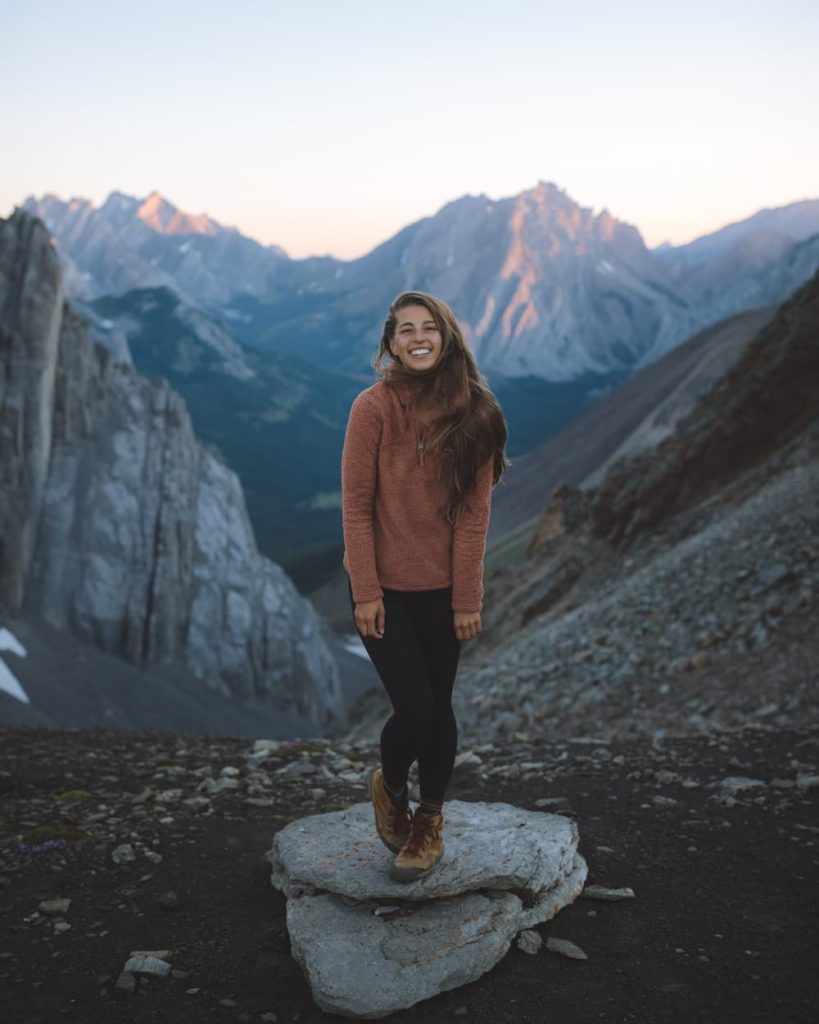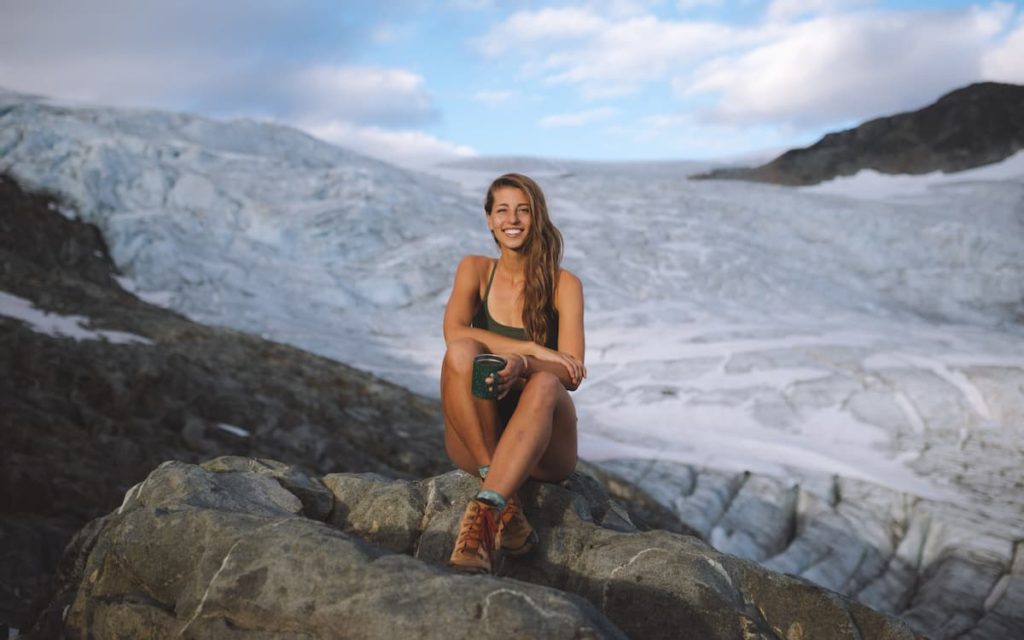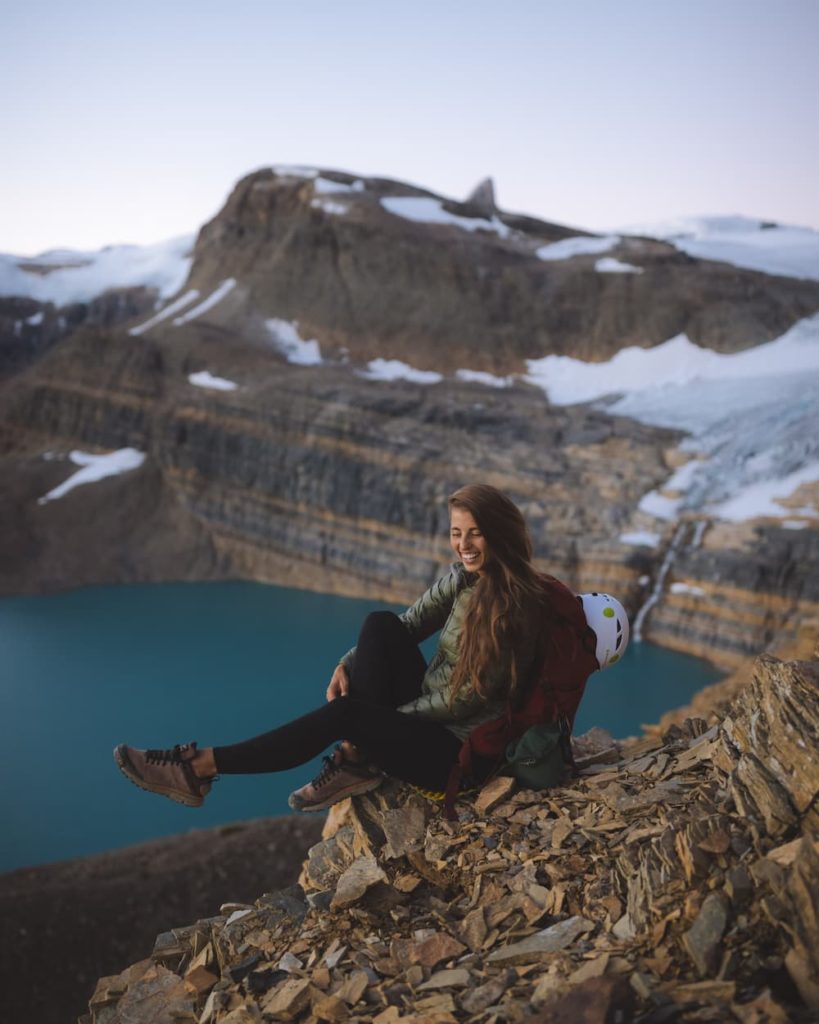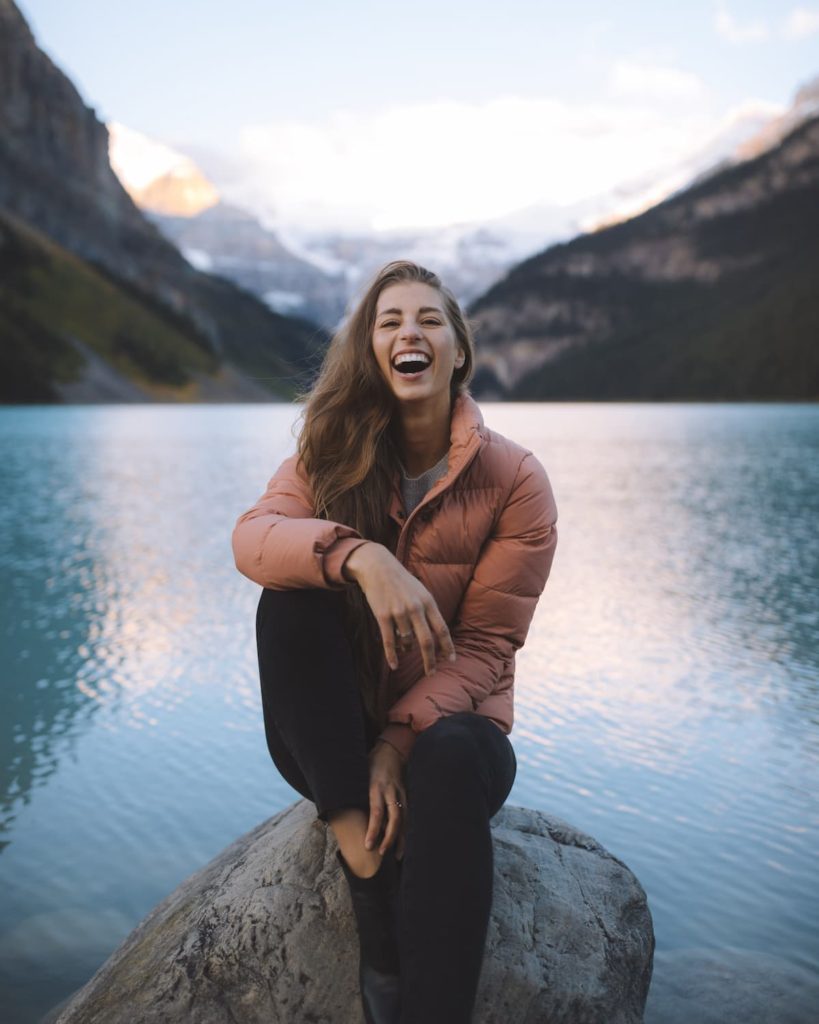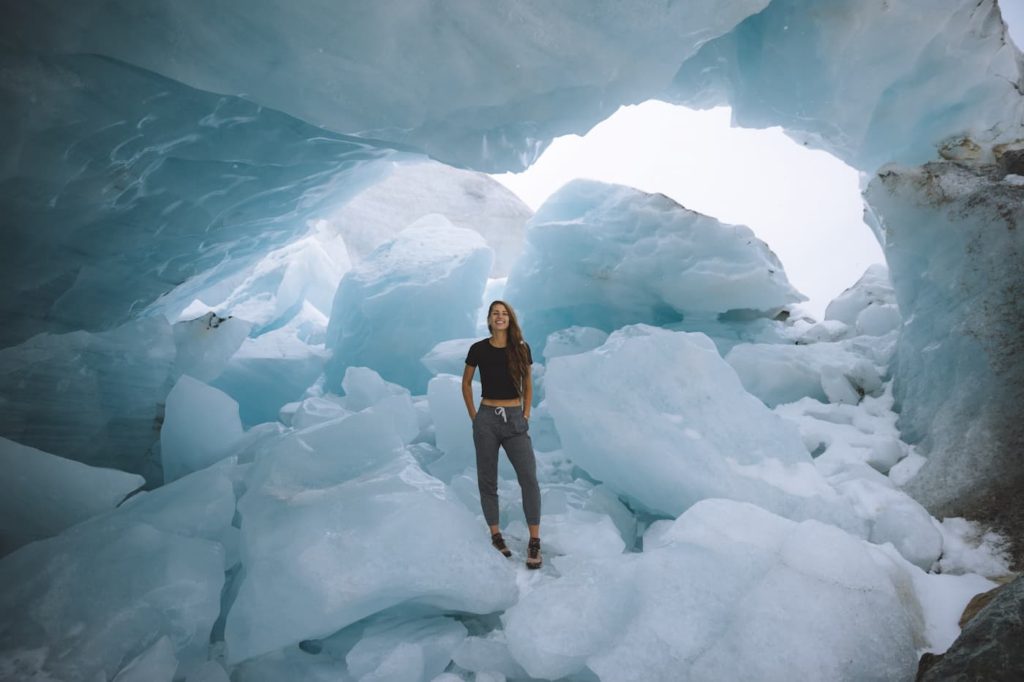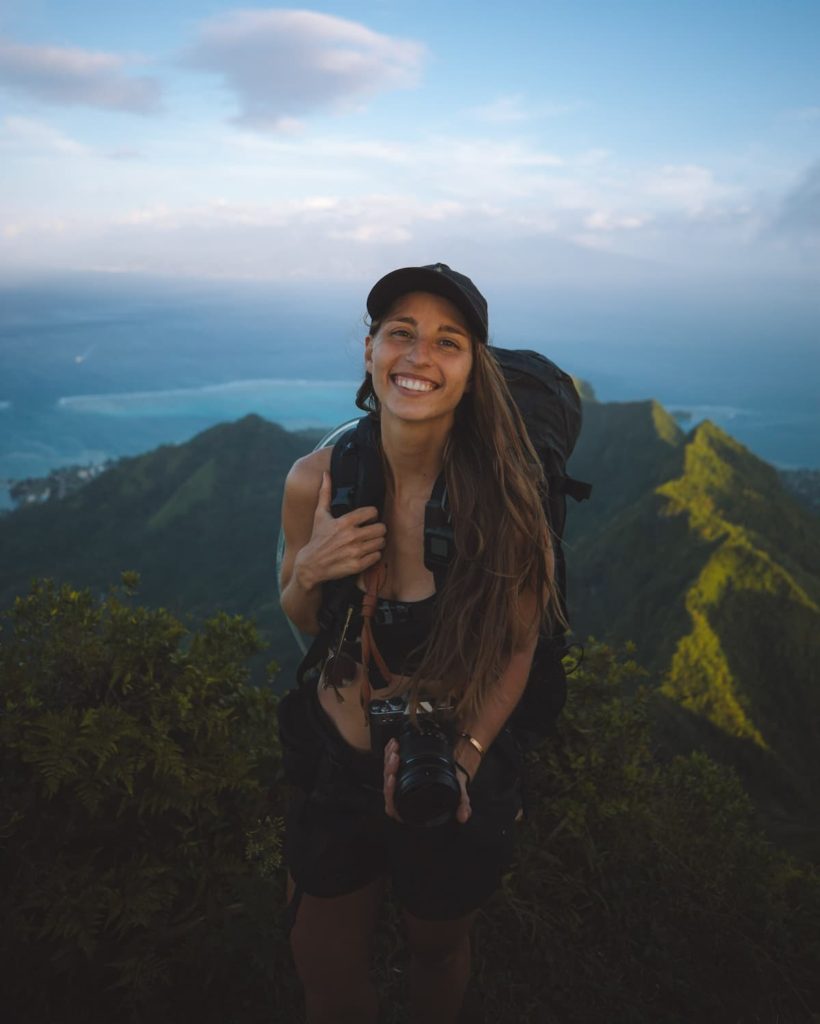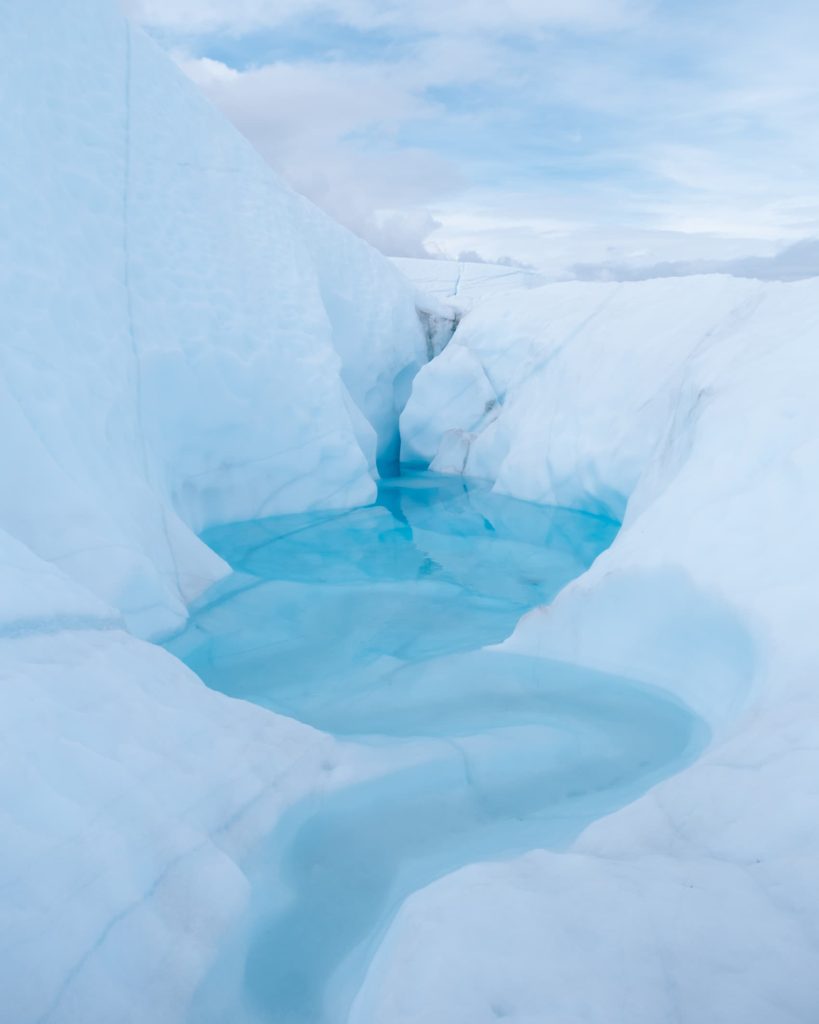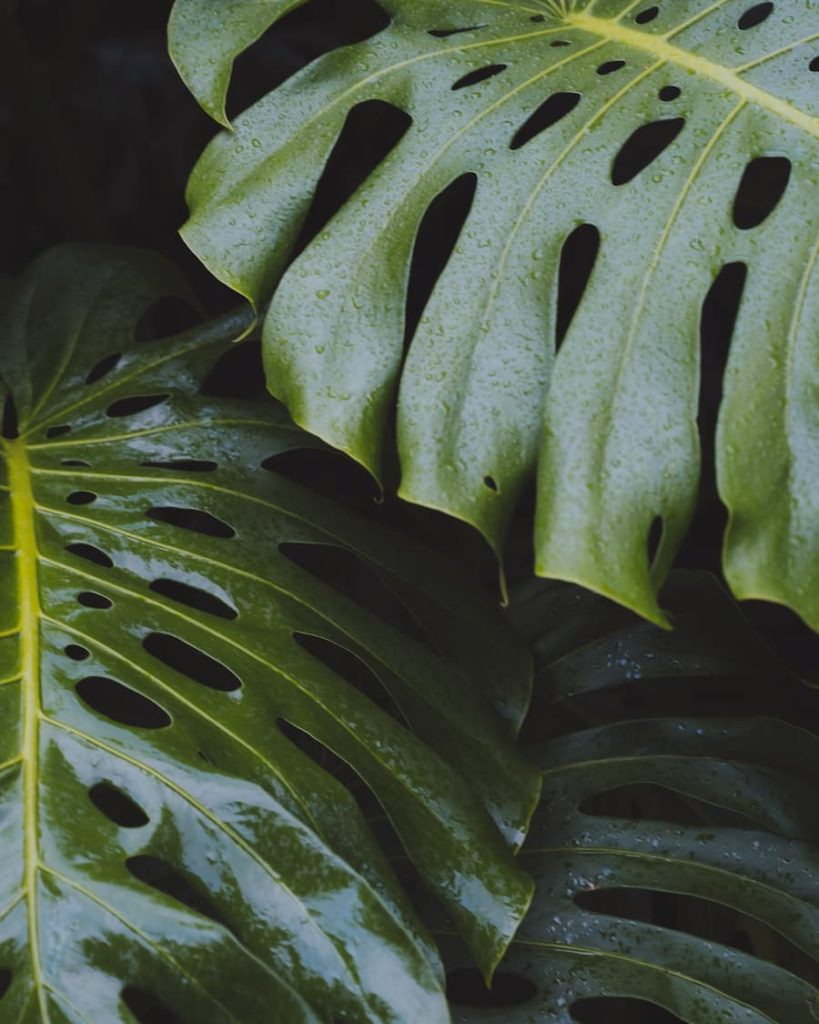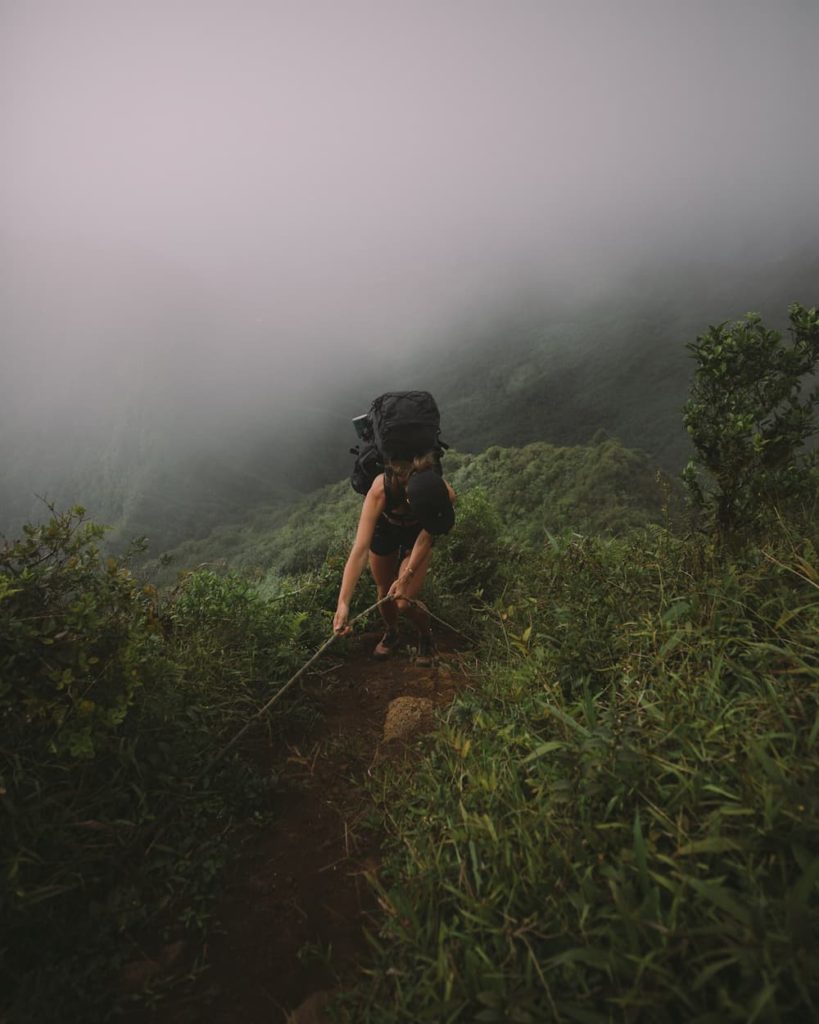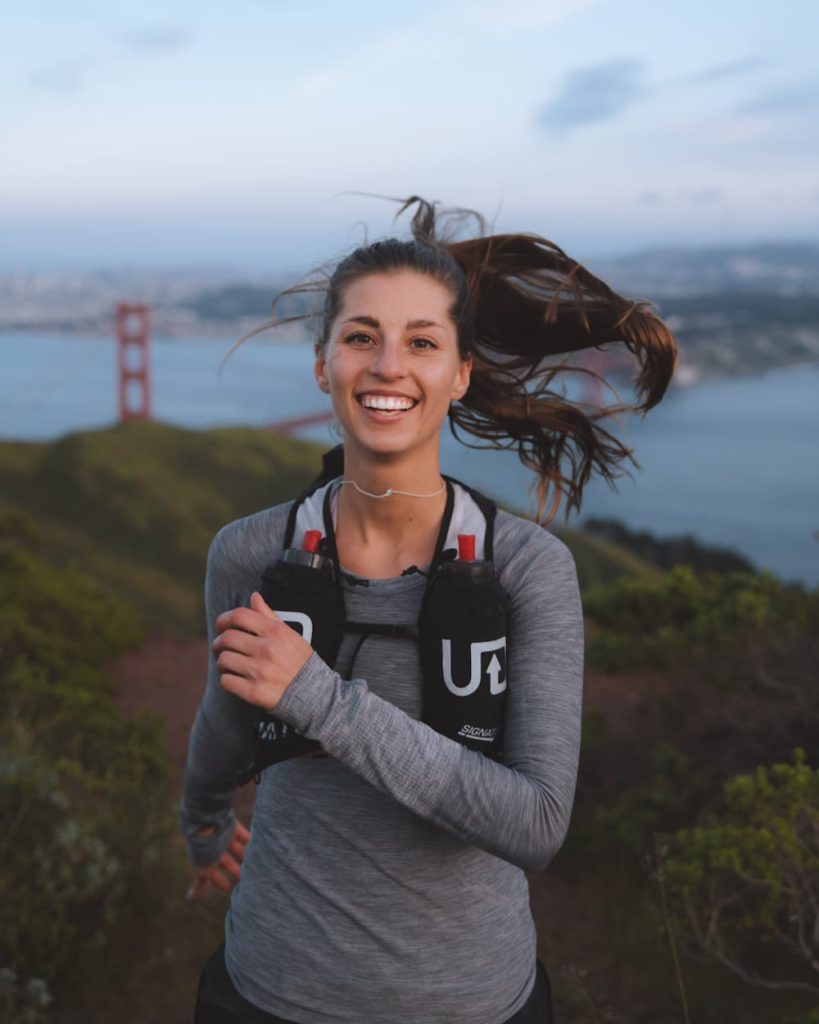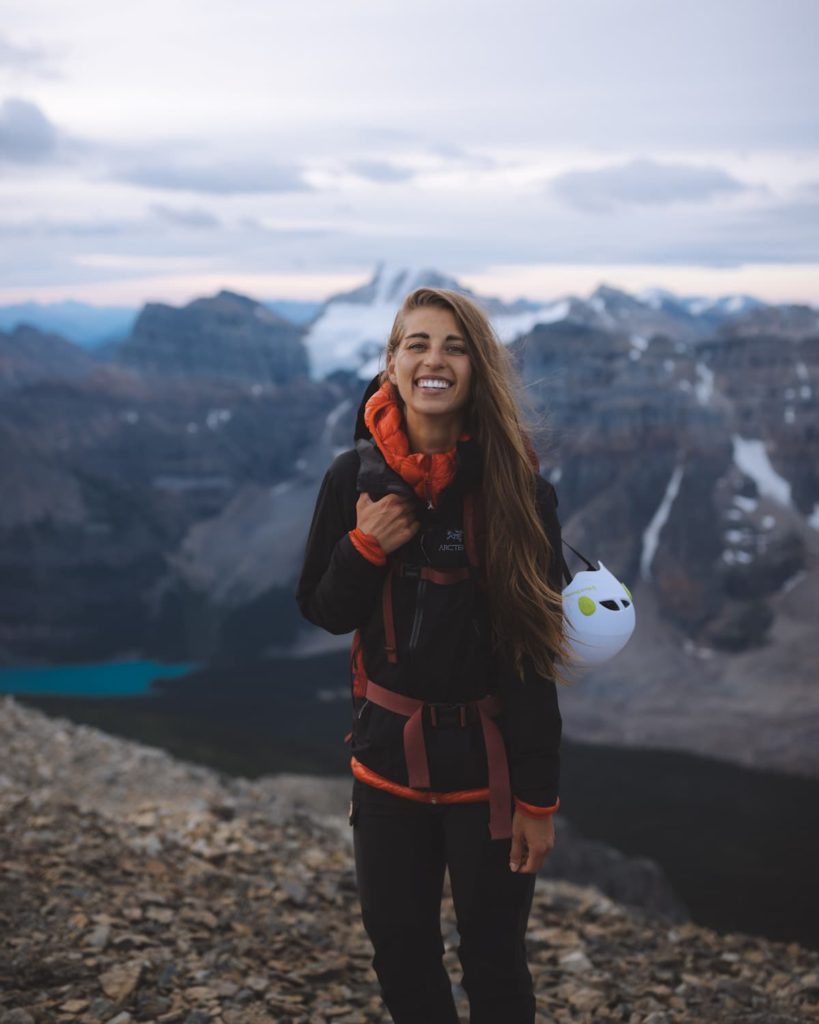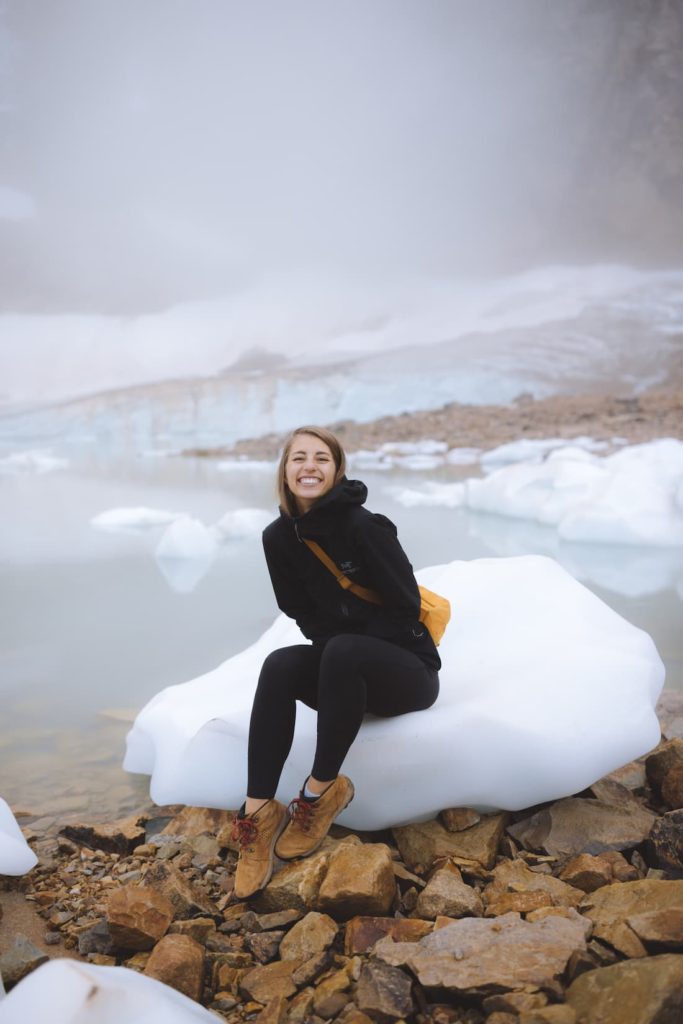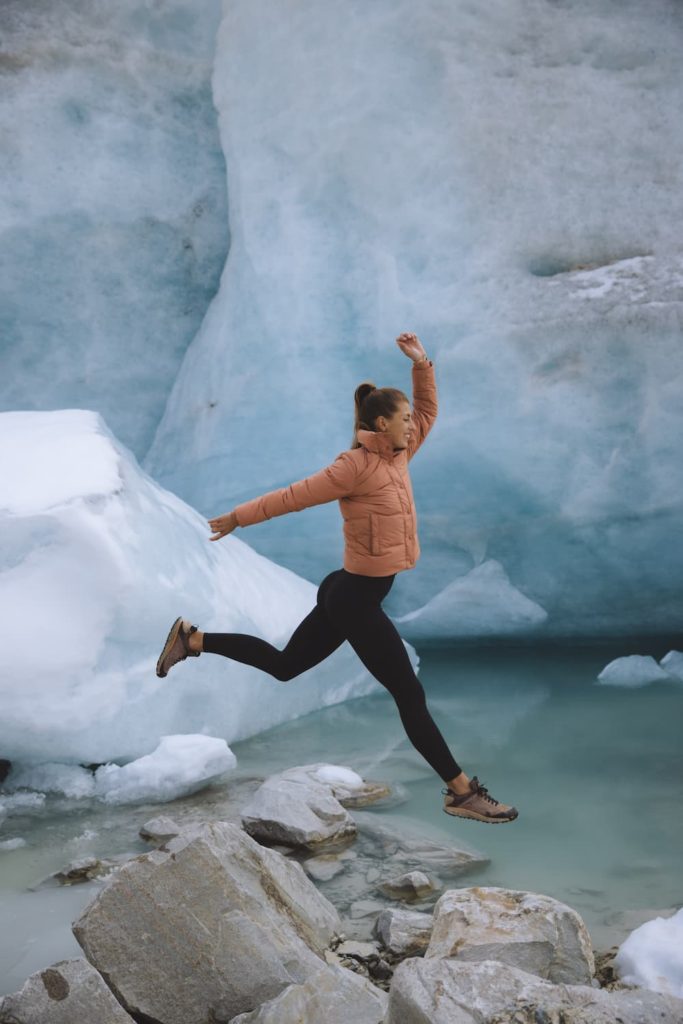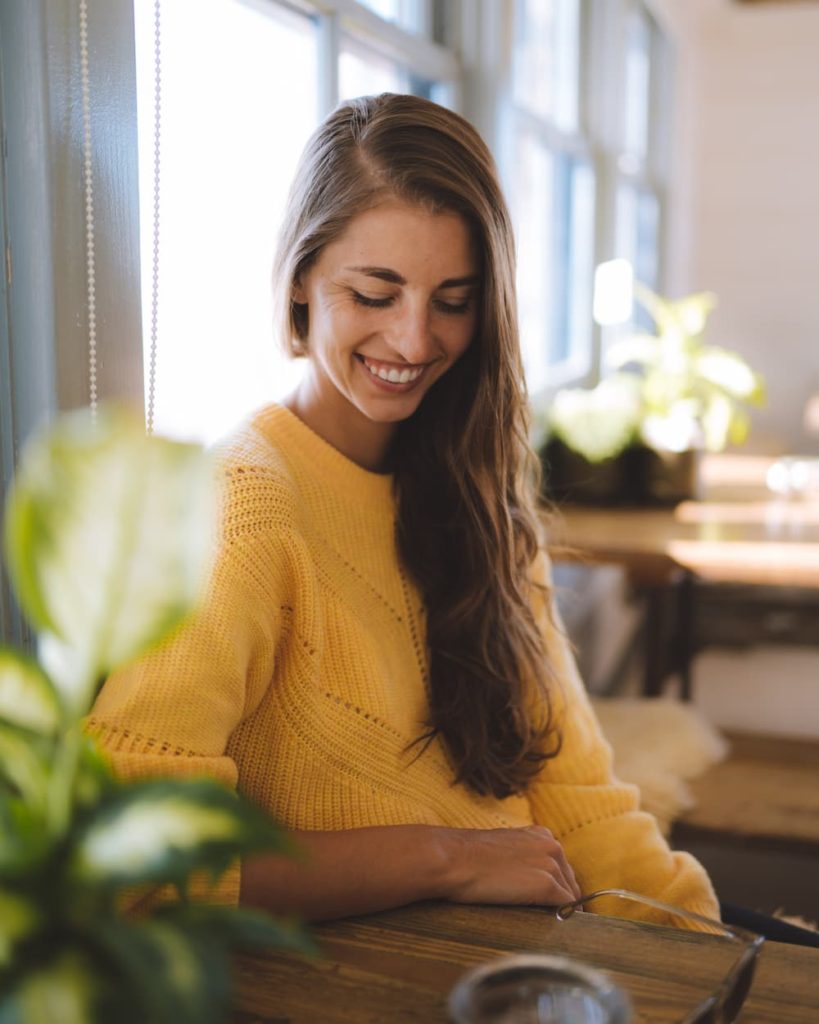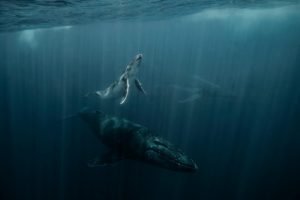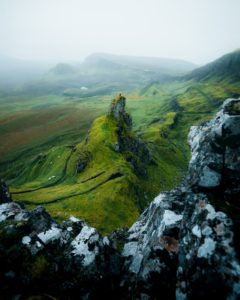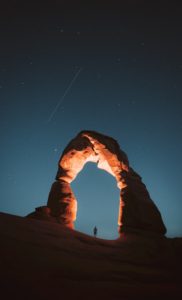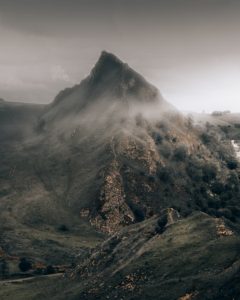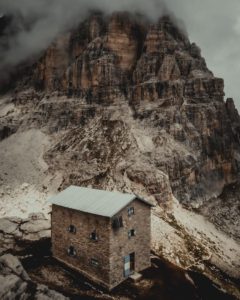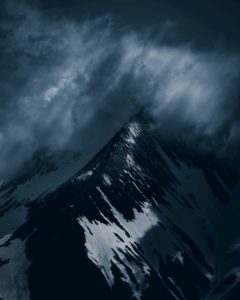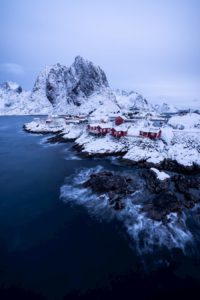
Andrea Ference
@vagabondhearts
Backcountry camping expert and
content creator based in Canada
Introducing Andrea Ference
Born and raised in the foothills of the Canadian Rockies, Andrea spent her childhood gazing out the big bay window of her parents’ living room and daydreaming about what it would feel like to stand atop the glaciated peaks that seemed just out of reach.She would wonder about the animals she would encounter along the way, and about first ascents (before she knew what the term meant.) As she got older her days were spent exploring the forested hill in her backyard, building forts and collecting rocks and sticks long past bedtime. A few years and a university degree later she finally began the explorations she had long dreamt of, a hobby that became a passion but, eventually – her after work, weekend and holiday expeditions were not enough and she left her corporate job to pursue a life of adventure full time.
In this interview Andrea shares with us what she has learnt throughout the process of becoming an expert in backcountry camping. While providing us with practical advice about self-education, preparation, and safety. She also speaks about the benefits of nature and our mental health and what mindset allows her to grow as a content creator, while living her own definition of success.
Interview
Welcome Andrea!
How would you describe yourself and what you do?
I am often described as “spicy” – I never know if it is meant as a compliment but I will take it as such. I am honest and real and raw. I speak my truth and stand up for the things I believe in. I grew up on a farm, with two older and two younger brothers, and my parents who are partners in every sense of the word. They run their business together, and when I was young they would trade off between staying home with my siblings and I, and holding board positions or working outside of the house/off the farm. I think that this instilled a sense of self drive success. Realizing that a lot of young women do not have an extreme level of equality modeled for them, has made me want to publicly showcase my less-conventional passions, in the hopes of inspiring at least one little girl, somewhere, to march to the beat of her drum and do what society tells her that she can not. So that is what I do. I hike, I run, I cycle, I backpack, I climb, I dive, I camp…
"I do everything I can to get outside more than I already am. And I share this with others to inspire and make the world a better place."
You once said that after you graduated from university you were feeling a little lost, wondering who you are. How did travel and spending time in the mountains help you find yourself? What advice would you have for someone who is struggling with those questions?
It was a few years after I graduated university that I got into traveling and hiking, and backpacking.I think that the time spent between high school and finishing university is a hard transition for a lot of people, myself included. I get emails too often from young adults (some kids) looking for guidance. Most asking how to “do what I do” – and I never have a good answer. My journey to wherever I am (even that I have a hard time defining it) is more than a decade long with years spent questioning who I am, who I want to be, and trying to fill the chasm between the two.
I spent four years in university, and then sitting behind a desk in an office, in the heart of a bustling city, and I would not change any part of that journey. I tell anyone who will listen that I was equally as happy, sitting in that office, as I am today – to which most people call me a liar, or roll their eyes, or otherwise less-than-politely exit the conversation.
"However, the biggest lesson that I have learned is that happiness really is an internal construct."
I think that being a generally positive, happy, and upbeat human has brought me a lot of opportunity and opened a lot of doors. But at the end of the day, if tomorrow this weird and wonderful journey I am on stopped – I would show up to a 9-5 job every morning with a smile on my face (and a few cups of coffee running through my veins).
In your mid 20ies you went on your first backcountry camping trip. How has this trip changed your life? What emotions did you experience that invited you to keep doing this?
I think Cheryl Strayed says it best: “I was amazed that what I needed to survive could be carried on my back. And, most surprisingly of all, that I could carry it. That I could bear the unbearable.” Backpacking on its own is an empowering experience, and especially more so as a young woman. Every time I’m on the trail, alone, or with friends – I think of the lessons my parents taught me growing up, and the lessons I had to learn for myself. It was not until I moved away for University that I started to notice how differently men and women are treated in the world. Especially when it comes to assumed capabilities. I grew frustrated at how little was expected of me, and I rebelled against the norms (almost subconsciously.) The life goals that I perceived as expected of me – I pushed back against. I didn’t get married or have children in my twenties (not that there’s ANYTHING wrong with choosing that path, to be very clear) and as time went on I demanded more of my physical capabilities. It was after I got home from my first backpacking trip, sunburnt with bruised hips from a too heavy pack and scratches from a tumble or two, when I had that “oh sh*t” moment – I can do this! I can take care of myself. It was the defining moment for me; since then I have spent hundreds of nights in the backcountry (many completely alone), fending for myself and that feeling has never worn off. It makes me feel as though there is nothing I can not do.
What was the moment you realized running up and down the mountains and spending the night outdoors was your passion? How did you move from your corporate job to what is your career now?
Over four years after leaving my corporate career path, it still feels surreal to be able to call this my career. It was never something that I actively pursued, which I think is what makes me successful. I am very fortunate to have built a career based on simply being myself. Doing the things that I love to do, with people I enjoy spending time with. When I was working in my corporate job, I found myself popping out to the mountains after work or on weekends, trading bonuses and pay increases for more vacation time. I would travel and hike and simply explore – and then I found myself in the right place at the right time.
There was no true strategy to closing that chapter and pursuing a life of travel and hiking. It was more of a perfect set of circumstances than a formulated “escape” plan. I had been with my firm for a handful of years and really loved what I did, I had an amazing boss and worked alongside a team of people who I enjoyed working with, and really respected. But I was seeing an influx of opportunities in my inbox within the social media travel industry and in all frankness, I simply ran out of vacation time. It was mid-February and I essentially had not shown up to work that year. I asked myself: “If not now, when?” and I honestly thought that it would only be a few months. I would get this out of my system and come back to work in the autumn. It was a very passive decision, I still think I am very passive about how I approach this industry, it can be extremely volatile.
Running in the mountains isn’t easy, neither camping is the most comfortable you can get. What has been your biggest victory/accomplishment in all those years you have been heading into the mountains?
I firmly believe that the real accomplishment is finding joy in the small moments. This is something that the world seems to have learned with the 2020 COVID-19 pandemic. Sure, the big summits and long trips and bucket-list-worthy destinations are great, and I feel as though I am always chasing bigger objectives. But because of the pandemic, we have all been gravitating towards a simpler life: we bake sourdough bread, and are learning to cross stitch, and hardware stores are sold out of nearly all home renovation and DIY supplies. Bikes and skis are selling out as we stick closer to home – and we are collectively realizing that happiness, joy, and beauty can be found just as easily in our own backyards as it can be by jumping on a plane and traveling to the other side of the world.
How did you educate and train yourself on backcountry camping and running physically and mentally?
I invested a lot into this. A lot of time, a lot of money, and a lot of energy. My first backcountry camping trip was to the bottom of the Grand Canyon with my mom, my aunt, and a great family friend. By hiring a guide we all learned the basics: how to properly pack a backpack, how to gauge our water and nutritional needs, how to read a topographic map, how to go to the bathroom in the outdoors… We were able to ask all of our questions in real time as we thought of them. By starting my journey this way I feel as though I gave myself a strong foundation. I felt confident in my natural abilities and also lost a lot of the shame in being a beginner and not knowing where to start or how to ask questions. I think that is something that a lot of people looking to get into the outdoors struggle with. Since that trip I have taken a handful of classes and courses so as to not be limited in my experiences by my abilities. Some outdoor survival and navigation, rock climbing, avalanche safety – just to name a few. There is a lot that you can learn from reading blogs and watching YouTube videos and hanging out with more experienced friends but, in my opinion, there is nothing that can replace the investment in doing things properly and learning the skills.
You seem expert on ‘how to spend the day/night in the mountains comfortably’, having many tips, trics, gear and checklists available on your website. What are your comfy-but-not-essential items you like to bring with you?
My top five would be:
1) A camp pillow
2) Silk sleep cap (to keep my hair from knotting)
3) A sweatshirt
4) Camp booties
5) Nighttime Hot Chocolate/Apple Cider/Tea
Your backpack is your home, containing all you need depending on the location and weather but also to guarantee safety. What are some items you always pack for safety, but that most people wouldn’t think about packing? Why do you bring those?
Outside of my “Ten Essentials” that really everyone should have any time that they head outdoors, there are a few things that I would not leave home without depending on what I am doing, and where I am going. The newest is my Garmin InReach Mini – its primary function is as an emergency device. It has an SOS button on it and will signal for an emergency evacuation – something you hope to never need but could be fatal if you need it and do not have it. It also allows me to text with my parents while I am out in the backcountry which I thought would help with their peace of mind but I don’t think they actually worry about me anymore – which is nice. The other is a helmet. Especially in the Canadian Rockies – there are a lot of “easy” scrambles that beginners will go on unprepared. If there is any chance of rock fall I will bring my helmet with me. You never know if there is a group above you, an animal, some really strong wind or just a very loose rock that could fall and to me it is not worth the risk. You can see my full list of backcountry safety equipment on my blog.
Top 10 safety gear
1) Navigation
2) Headlamp + batteries
3) Sun protection
4) First aid
5) Swiss knife
6) Fire
7) Shelter
8) Extra food
9) Extra water
10) Extra clothes
Extra: water filtration system, bear spray + food storage, helmet, signal mirror, mask, reusable trash bag.
What anecdote comes to your mind that taught you to never forget a specific gear/item?
I don’t remember the last time I went out and didn’t forget something. So I guess I have not learned this lesson yet (hopefully one day I will). I have shown up to races missing a shoe, I have shown up for climbing without my helmet, and just a few months ago I went on a road trip to a series of backcountry alpine lakes and did not bring a swimming suit. If it is a safety concern (such as with the helmet) I will either sit it out and my friends will go without me – or my climbing/hiking partner and I will decide if we will change our objective and do something that does not require that piece of equipment. I am very hard on myself, so being as forgetful as I sometimes am is extremely difficult for me personally. If it is a safety concern, it is a no-go, but if it is more of a comfort/luxury item I will opt to just be uncomfortable and hope to not forget it the next time. I try to have my own gear guides and packing lists open while I am preparing and my hiking partners/friends and I will typically do a once-over essential items check before leaving just to be sure. But unfortunately we all make mistakes sometimes.
What has been your longest camping trip ever? How do you manage these kinds of long term camping trips in terms of gear, health, routes and company?
I like to go out camping often… but not too long. I suffered a spinal injury in my late teens and it is kind of a miracle all on its own that I am able to backpack. The longest trips were around a week with a hiking partner, and four or five nights alone. Preparation is really the name of the game with these – I am (finally) in a really great groove in terms of knowing what gear I will need to bring, and how much food, and which layers based on weather and distance and elevation and terrain. And all of that comes with experience – years of trial and error. The more prepared I am the more confident I feel. In terms of company – I will always do a day hike with someone, and then an easy one night backpacking trip before committing to anything longer. I think, like anyone, I look for hiking partners that are not only physically capable but who I actually enjoy spending time with.
How do you make sure you nourish yourself nicely and healthily on your trips? What is important and practical for you in terms of food and beverages?
I use my time in the backcountry as my “cheat” days (not that I am on any specific diet) and my rule is that if it will fit in my bear bin (storage container that is bear proof) it can come with me. I have a hard time eating and drinking enough so I do my best to have snacks and food that I really want to eat.
The foods that are in my “backcountry pantry” right now include:
– Instant Coffee and Collagen Creamer packets (night)
– Apple Cider, Hot Chocolate and Tea (night)
– Ramen noodles
– Protein Powder
– Energy/Protein Bars
– Powdered Peanut Butter
– Trail mix, Nuts and Seeds
– Almond Butter or Peanut Butter Packets
– Instant Oatmeal
– Tuna or Chicken in foil packets
– Freeze Dried Dinners (Some of my favourites:
– Instant Mashed Potatoes (just in case you add too much water to your dehydrated meals and/or to bulk up calories/carbs)
– Instant Soups
– Instant Mac & Cheese
– Pasta and Rice Sides
– Couscous
– Dehydrated Vegetables (too add into Mac and Cheese and Ramen)
– Dried Fruit or Fruit Leathers
– Jerky
– Candy – so much candy and chocolate
In terms of hydration, I will always carry two water bottles, one with water and one with electrolytes and I will bring backup electrolyte tablets. They taste great which helps me drink more and also replenish the electrolytes that you sweat out while hiking.
Camping and hiking is already a sustainable way of traveling, but what actions do you take to ensure reducing the impact you have on the environment when camping to contribute that way to the conservation of nature and our planet?
I often speak about the principles of LNT (Leave No Trace). I treat these as law and oftentimes forget that they are actually guidelines. It’s the small things, like picking up garbage any time I see it on a trail to ensure that I am leaving the planet better than I found it. I have also been trying to add resources to my website for things such as how to properly go to the washroom in the wilderness, and backcountry safety tips, and gear with the hopes that people will not only treat our planet better but also feel more comfortable and confident going into their own backyards which in turn would hopefully cut down on less-sustainable travel. win-win-win.
How does being, exercising and sleeping in nature so often contribute to your mental well being? They often say finding yourself in nature stimulates mental healing and grounding, but what is it exactly that makes the difference between simply being outdoors and truly immersing yourself in nature?
I really love how much progress we (as an outdoor community) have made in opening the conversation regarding mental health over the past handful of years. As someone who, I think, has always struggled with anxiety but only had it diagnosed in recently, I find that giving myself a little bit of time and space from the constant buzz of the city, both the noise and the energy, rejuvenates me. As a naturally introverted person this (escape) is immensely important to me and why I turn to the outdoors in the way that I do. When I was younger, I would hop in the car and head to the mountains to give myself space, and I would come home feeling like a new person but never really could verbalize it in a way that would make sense to anyone else. It was not until the world really started opening up and talking about mental health that everything clicked for me. From the exercise standpoint, we release endorphins when we exercise that literally make us feel better. I think that for people struggling with anxiety or feeling overwhelmed taking a break and going for a walk in nature, unplugging from technology and having a literal breath of fresh air can absolutely help. It is not a replacement for seeking professional help when needed but it can help a lot.
Sometimes, what we have been taught to be important or think to be important, isn’t actually that important. What is one of the most important mindshifts that you made? How has it made your life more pleasant and peaceful?
I touched on this earlier, but it is really about finding an appreciation for the little things in life. The small moments. Celebrating the little wins as much (if not more) than the big ones. I was in a very dark place five years ago and someone suggested that I start a gratitude journal (I scoffed, but did it anyways) and the first few weeks or months were hard. My mind was telling me that everyone and everything was working against me. Finding gratitude in those moments was exhausting. But the more that I trained my brain to look for the good, the more good I saw. This was one of the best things I have ever done for myself.
"Looking for and celebrating and appreciating the good things (no matter how small) makes me a happier person and a better friend and family member."
You are a morning person and journaling is part of your morning ritual. What does journaling add to your day? How does your morning ritual influence how you go through your day, through life?
Mornings are my favourite thing in the entire world! And thankfully they happen every day. So starting from the beginning, I have always been a morning person – I think I am very fortunate in that way. As said, I grew up as the middle child in a big family, (two older brothers, two younger), and there was not a lot of quiet time in my house. Which I think the rest of my family thrives on – and I can appreciate that there is something very comforting about the constant flow of energy in a home filled with people. However, my happy place is in complete silence. And I found that the only time I could be guaranteed to find that was before my family was awake, so mornings became my special space and that has carried on throughout my life. Fast forward to my mid-twenties when I discovered meditation, this was one of those things that, for me, felt like a missing puzzle piece (if you have not tried it – I recommend the 1GiantMind app and reading the book 10% Happier as great starting points).
"Once I started a daily meditation practise I found my thoughts became clearer, I was better able to manage my emotions, and handle the challenges life threw at me. It really made my life better and made me a better person - sounds a little woo-woo, I know."
Then in 2018 life threw me a curveball, as life does, and I found myself without a true/genuine support network for the first time in my life. I fell into a period of deep sadness; I felt angry and alone, and as if the world was working against me. And all of that was juxtaposed with needing to put up a front of happiness and inspiration and strength on social media. At some point, someone recommended starting a gratitude journal – writing down three things a day that I was grateful for. Seemed easy enough, but it wasn’t. It is hard to see the good in life when you are in a low place.
"Slowly but surely looking for happiness made me happier again."
And that is the very long story of my journaling. From three small happinesses post-meditation every single morning (when I am home) to what it is now. Some mornings it will still be simply that, others it will be a list of random thoughts or the start of a poem that will likely never be finished and others will end up being long streams of consciousness. I think that forcing myself to write something every day has helped me to organize my thoughts and also has (hopefully) made me a better writer. But my morning ritual is primarily for when I am at home; it helps ground my day and add in some sort of a routine – which is something I really miss from my corporate life.
You grew up in Canada and although you spend lots of time abroad and love traveling, your favorite flight is always the one back to Canada. Out of all the places you have set up your tent, what are some of your favorite camping spots?
I really do love being home and am extremely fortunate to live where I do, but I also do not share locations, as suggested by LNT in their social media guidelines (no specific geotagging on social media contributes to minimizing my impact). So I think I will need to be a little bit vague with this one. There is something really fulfilling about seeing a photo of somewhere that you have never seen a photo of, or looking on Google Earth at something that looks like it could be really amazing… and then working hard to figure out where it is. I love to problem solve so some of these research projects will last days or weeks, and I’ll be completely immersed in how to get somewhere. This happened earlier this summer with a little lake at the toe of a glacier. I saw a photo on social media with a very vague geotag (I am talking about hundreds if not thousands of square kilometers) – I spent some time, asked a few close friends, read a guidebook and a handful of blogs (the blogs were all dead ends or not where I was looking for), until eventually I thought I had found it. A few weeks later I started the journey to get there. And I almost cried when I realized I had found it. Sure, it would be easy to have had someone hand that information to me and I would have had a lot less ‘wasted’ time and energy – but I can not imagine having that sense of accomplishment without putting the work in. So to answer your question – there is something really comforting about visiting the same hike, trail, campsite many times over many years in different seasons… It feels almost like visiting your grandparents. Warm and inviting and familiar.
"But for me the things that set my soul on fire are the places I question if I dreamt it up. Spending so much time and energy and then when the day comes being flooded with emotion."
To conclude, how would you convince others hesitant to go camping (alone) to actually get out and do so?
I would firstly tell them to read my blogs about solo backcountry camping to make sure you are doing it safely. Being safe and being responsible (for yourself and the planet) are top two always. But after that, I would also say don’t jump into it. If you are really hesitant you likely aren’t at that point yet. Get really comfortable with day hiking (both alone and with friends, on busy trails, and more remote trails) and then move into the same with camping. Go drive up camping with friends, then do it solo, go to a busy campground with friends, and then maybe go solo. This is great because if there are any issues other campers are generally super helpful and you won’t really feel alone. And then try backcountry wilderness camping with friends (maybe even try a camping trip with friends but where you have your own tent and set it up a little further away) – get really comfortable with all of those with navigation and safety and how to go to the bathroom in the woods and how to store your food properly. And then, if you really really want to, then try solo backcountry camping. It isn’t for everyone – most of my friends both think I am crazy but also have no desire to try it and that is awesome for them (I cringe when they invite me to brunch on a Saturday – everyone has different tastes and preferences and desires). And for the record – there is nothing wrong with never wanting to try it. There is nothing wrong with hiking back to your car at 2AM because you weren’t a fan or you were nervous or could not sleep. There is nothing wrong with staying up all night watching Netflix that you downloaded on your phone. There is nothing wrong with using your satellite phone to text your parents. I have done all of these things. I am naturally a very solitude person and it took me years to get to a point that I felt comfortable going camping alone.
"Don’t rush it. Don’t force it but also - if it is something you really feel like you want to do - do it!"
Would you like content like this sent to your inbox?
